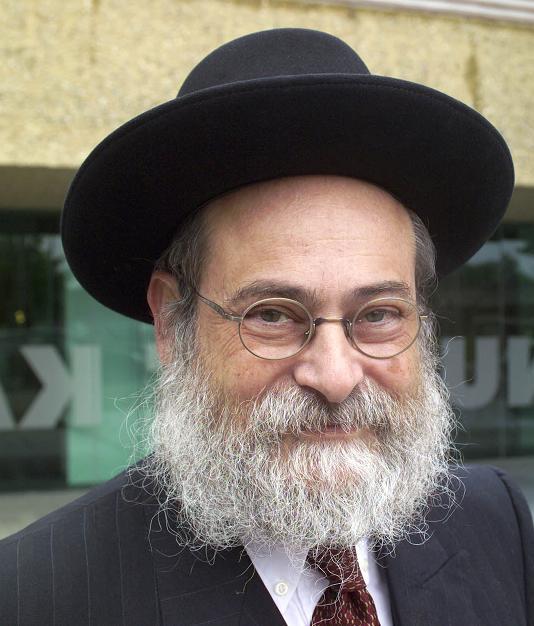
Youth Community

Aid Ukraine

Order Why Israel Resources

Support our ministry

Subscribe newsletter

Israel & Christians Today

Biblical understanding about Israel
"Born to suffer" - Editorial Israel & Christians Today
By Andrew Tucker
As I write this editorial it is the week before Good Friday and Easter, also known as Holy Week. I am reflecting on the holiness of Jesus, and His suffering in the days leading up to His death and crucifixion. In Luke 19 we read that when Jesus approached Jerusalem for the last time, He wept bitterly over the city. Although greeted by an exuberant crowd, He knew that just days later He would be rejected even by His friends, and die on the cross. I try to enter into His spirit of pain and loneliness. What was He thinking? What did He feel? What prayers did He offer up?
During our weekly prayers in Nijkerk, my brother-in-law Roger recounts his recent visit to Ukraine (March 10-15, 2016) together with the Chief Rabbi of the Netherlands Benjamin Jacobs. For six days, this Orthodox Rabbi and Gentile Christian travelled hundreds of kilometers and worked together with the Christians for Israel team led by Koen Carlier. They visited and brought food parcels to survivors of the horrors of World War II, and their families, many of whom are living in desperate poverty.

Rabbi Jacobs wrote in his blog at the end of the second day of their trip:
“I have been asked to write an encouraging word about the second day of our trip here in Ukraine. I don’t know if I can or if I even want to. On Yom Kippur in 1941, 33,714 Jews were herded outside Kiev. They had to carry warm clothes, travel documents and their valuables. They were slaughtered like animals. And then there were the 250 orphans in Breslau who, one by one, were pushed through a hole in the ice and never reappeared. And more recently a new mass grave has been found. How many are still unknown? And what is the situation now? A well-known saying in Ukraine today is: ‘if there is no water in the tap, then the Jews have drunk all the water.’ In the meantime, ten volunteers have arrived from the Netherlands and Belgium. They are going to hand out food parcels, and I am allowed to welcome them. Christians who voluntarily pay their own way to Kiev to help Jews whom they do not know. Yes, I am convinced that there are many differences between us Jews and Christians, but it is what we both inwardly feel that binds us. And there I am, a traditional Rabbi with orthodox Christians, together in friendship. On the very modest monuments that remind us of the dark grey past, are texts in a language I do not understand. I cannot distract my thoughts from the stories I have heard from the very few remaining survivors we have been able to meet. But nowhere have I seen a recognition by the Ukrainian people themselves of their own guilt. It was always the fault of the fascists. We drive on towards Vinnitsa, over roads that are full of pot-holes. Then there is a phone call. In the opposite direction, a mini-bus is coming en route to Kiev with nine Jewish persons who have decided to leave the Ukraine and emigrate today to Israel. We meet them at a car park. I rush out of the bus and run towards these nine people who have decided to leave this nasty country. Next to the driver in the front of the bus is an elderly couple who will live their remaining years in Be’er Sheva. In the back a family with a small boy, and in the middle another family with two children. They look at me, and I greet them. I recognize their uncertainties. They are leaving everything behind, and their future seems far away and unknown. I bless them and wish them well. I am allowed to encourage them in their decision. In my head the images swirl around of the two hundred and fifty orphans. I cry from sadness, but also joy”.
I cry too.
On my desk is a large, heavy book entitled “Born to suffer? The catastrophe in Ukraine 1941-1944.” It contains the stories of survivors of the horrific years in Ukraine from 1941-1944, when the Germans, Romanians and Russians systematically slaughtered over one million Jews in Ukraine. In Odessa alone, 200,000 Jews were killed. In the 1930’s, Odessa was a bustling city with an international atmosphere. Many people of various nationalities lived there amongst the native inhabitants of Odessa – Jews, Russians, Germans, Ukrainians, Greeks, Bulgarians and Armenians. Christians, Buddhists, atheists, Jews. The town was a centre of Yiddish culture, and about 33% of the population was Jewish. Life changed for the Jews of Odessa in 1939 when the Russians signed the Molotov-Ribbentrop pact with Germany. The Jews became the target of discrimination. All hell broke loose in June 1941, Germany and Romania attacked the Soviet Union in “Operation Barbarossa”, and war was declared. Hundreds of thousands of Jews were massacred in the southern part of Ukraine alone. Only a few survive, some of whom are still alive today to tell their story.
How are we to reconcile their stories with the account of Good Friday and Easter? Is it possible to enter into the suffering of Jesus, without remembering also the suffering of His own people? Does the history of the Jewish people help us to understand who Jesus is?
The Bible teaches us that the suffering of Jesus was necessary, and that it was the path towards the resurrection. I would not dare to say that the suffering of the Jewish people is “necessary”. But it would seem that their difficult path is part of God’s mysterious dealings with all the nations, and that it will end in the total restoration of the Jews as a people in the land God has promised them. As Paul says in Romans 11: “if their rejection [of Jesus] is the reconciling of the world, what will their acceptance be but life from the dead?”
Psalm 126 reminds us that “those who sow with tears shall reap with songs of joy”. The Lord has also promised that He will “swallow up death in victory, wipe tears from off all faces, and take away the rebuke of his people from off all the earth” (Isaiah 25:8).Is it possible that, when Jesus saw in His mind’s eye the future destruction of Jerusalem (Luke 19), He also saw the yet more future suffering of the Jewish people in Europe? Is it possible that He somehow carried the future sufferings of His own people with Him as He walked through the streets of Jerusalem and ultimately to Golgotha?
Is it possible that His resurrection is also a guarantee of the future resurrection of the Jewish people?I hope so. And I hope and pray that the Lord Himself (Yahweh) will comfort the hearts of the survivors (and their families) of those terrible events that took place on European soil only seventy years ago.We must learn from the past. “Never again” must be our motto. I am convinced more than ever how important it is to make sure that the Jewish people today are not again marginalized, that we protect their right to live in safety in Israel and that we recognize their right to exist as a nation amongst the nations. No, more than that, that we honor them as if we see Jesus in our midst. Their suffering is His suffering. His suffering is our suffering.
We as Christians for Israel support the work of Koen Carlier and his team in Ukraine, who are laboring day and night to honor and serve the remaining Jewish survivors in Ukraine, and help them, their families and friends to come home.
You can read more about this work in the forthcoming edition of Israel & Christians Today. I invite you to partner with us in this ministry to serve the Jewish people.
Please pray for the situation in the Ukraine, for the Jewish people, for the churches and for the local people.
Christians for Israel has set up a special fund to help Jewish people to prepare themselves to make aliyah (emigrate to Israel).
Please donate to help Jewish families in the Ukraine to prepare for their return to Israel!
Go to http://www.c4israel.org/c4i/newspaper if you want to read the Israel & Christians Today newspaper online or if you want to receive a printed version.
Andrew Tucker
Executive Director of Christians for Israel International
Legal Counsel for the European Coalition for Israel



